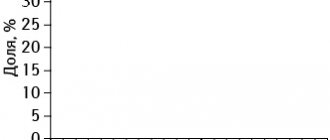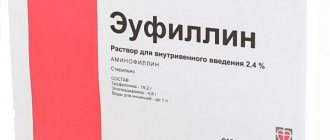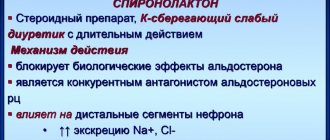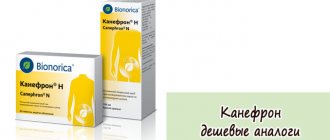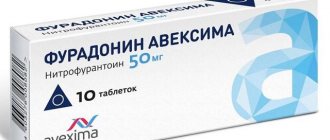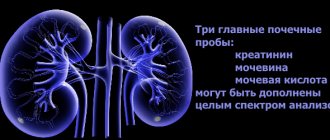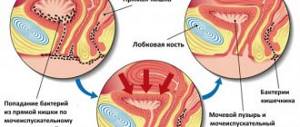| Compound: | Apis 3, arsenic 6, Apocinum 3, sugar granules. |
| Indications: | Kidney swelling in the face (under the eyes). |
| Mode of application: | 7 granules 3 times a day. Dissolve within 30 minutes. before meals. Course of treatment 1 pack. |
Contraindications: none identified.
Side effects: not identified.
Storage conditions: Store at a temperature not exceeding 25 ° C in a dry place, protected from light, out of reach of children.
Shelf life: 5 years.
Available without a prescription. Price: 180 rubles.
Renal edema sometimes reaches large sizes and is always accompanied by disturbances in the functioning of the kidneys. Inflammatory processes in the organ do not allow it to remove salts in the required volume, so they accumulate in the tissues, and the fluid passes from the blood into the surrounding tissue.
Homeopathic diuretics for edema
Edema, as a symptomatic manifestation, accompanies many diseases and conditions. The use of diuretics is not always desirable or possible. In addition, classic diuretic drugs have a number of serious side effects, such as the leaching of beneficial salts, minerals, and trace elements from the body. Homeopathy offers an alternative.
Homeopathic diuretics can effectively cope with edema in pregnant women, children, weakened patients and the elderly. Source: flickr (zilpha Chouinard).
Homeopathy has extensive experience in the treatment of edema, accumulated by generations of practicing doctors. She offers proven remedies for the treatment of edema of various etiologies. This:
- general swelling, for example in infectious diseases;
- local swelling due to allergic reactions;
- swelling of the body due to insufficient heart function;
- swelling of the legs during pregnancy;
- swelling due to kidney disease.
The main difficulty in treating edema with homeopathic diuretics is their correct selection. Homeopathy is most effective when the medicine and the patient completely coincide in constitutional characteristics and accompanying symptoms. However, there are also homeopathic diuretic tablets for general use.
General purpose homeopathic diuretics
Homeopathic diuretic for general swelling of the body or when its nature is unclear. Potassium preparations for edema are also used in classical medicine, but potentized potassium has a stronger effect. This remedy is especially effective in patients with high nervous excitability.
The drug from bee venom is used for any type of edema, regardless of its location and etiology. This is the best first aid remedy for acute illness.
Indicated for any diseases that are accompanied by panic attacks, depression of spirit, and depressive syndromes. Effectively relieves swelling of any localization - both local and general.
The drug is used to treat chronic, persistent edema. Indicated for liver damage, bloating, and digestive disorders.
Aceticum acidum + Kalium aceticum
A preparation of acetic acid and potassium salt is indicated for general and local edema caused by traumatic effects. This may include burns, soft tissue injuries, and surgical interventions.
Homeopathic medicine prepared from dried sheep thyroid gland. Effective for edema of various etiologies, especially indicated for children with delayed physical development.
Treatment of edema with homeopathic diuretic tablets has a number of advantages over traditional therapy:
- All homeopathic remedies do not harm the patient’s body and have no side effects.
- They can be used in treatment for as long as required, without getting used to the drug and without withdrawal symptoms.
- They can be used in complex therapy, along with traditional medicinal drugs.
- They do not remove potassium from the body, do not cause seizures or disturbances in the functioning of the heart.
- When removing edema, they do not cause thirst.
All of the above benefits of homeopathic diuretics are especially valuable for pregnant women and patients with a history of chronic pathologies.
Homeopathic treatment for facial swelling
Eliminating the cause of swelling on the face is necessary with drugs that have a gentle effect on the body and mild diuretic properties with minimal side effects . Therapy should be aimed at treating the cause of the underlying disease that caused fluid retention in the tissues. The specialist prescribes homeopathic medicines, taking into account the accompanying symptoms:
For heart disease the following may be prescribed:
- Kalium carbonicum. Indicated for general swelling and swelling of the upper eyelid. Helps remove excess water accumulation from cells;
- Apis . Recommended for relieving swelling of any type, effective in the early stages of diseases;
- Arsenicum album . Recommended in the presence of swelling caused by cardiovascular diseases, recommended to reduce thirst;
- Digitalis . It has a beneficial effect on muscle spasms, relaxing them and reducing overall tone. Prescribed to patients who experience edema as a result of a side effect after taking heart medications. Eliminates arrhythmia and normalizes the functioning of the digestive system;
- Populus compositum . A composite homeopathic remedy that has the ability to slowly remove excess fluid from the body, while at the same time preventing it from dehydration. Recommended for women expecting a child with renal failure in the last weeks of pregnancy;
- acidum + Kalium aceticum. Complex treatment with two drugs can reduce swelling after surgery or due to injury;
- Thyroidinum . Well tolerated by patients of any age, even children. Indicated for use in patients with chronic recurring edema, especially as a result of disruption of the endocrine system;
- Hina (China). Recommended for patients with a vulnerable nervous system, as well as for chronic edema, accompanied by weakness, stool disorders, abdominal pain and insufficient fluid intake into the body.
Photo 2. The use of homeopathic medicines should be strictly adhered to dosage. Source: Flickr (marion manoir)
Homeopathy for edema in pregnant women
The use of classical diuretic drugs during pregnancy is extremely undesirable, but swelling should be removed.
Edema in pregnant women leads to a general deterioration of the condition, increased blood pressure, and the development of toxicosis. Source: flickr (kiril pipo).
The causes of edema in pregnant women are not necessarily pathological - rather, it is rare. In the later stages, swelling of the legs, arms and face has physiological causes associated with the normal course of pregnancy.
Populus compositum
Drops in alcohol solution. Multicomponent drug from Biologische Heilmittel Heel GmbH (Germany). The composition includes 23 homeopathic remedies. Populus compositum is indicated for relieving edema in renal failure, which is often observed in pregnant women in the last trimester. Prescribed to drink. 10 drops of the medicine are diluted per liter of water and drunk throughout the day. The diuretic effect is mild, the course of treatment is up to 3 weeks.
Diuretic
A homeopathic drug with the self-explanatory name Diuretic has indications similar to Populus compositum. The complex preparation includes 3 components Arsenicum album 6, Apocynum cannabis 3, Apis 3. Effective for facial swelling after sleep.
Who should avoid diuretics and when?
An absurd complaint about a sometimes swollen face in the morning is unlikely to be a reason for any sane person to see a doctor. In this case, no one will ask to take time off from work or call an ambulance. But! If it seems that this is a symptom, you can contact a private diagnostic center with any symptom and undergo general tests. It is better to take care of your own awareness. What if, combined with the results obtained, such an absurd complaint is a compelling reason for the therapist to take the problem carefully and seriously? An absurd symptom combined with an initial diagnosis is the first step towards treatment.
The main contraindication for taking diuretics from official and traditional medicine is kidney disease. Kidney diseases, as the direct source of the problem, often require medications, diets, long-term treatment, and long-term rehabilitation. You cannot do without the help of a good doctor.
Diuretics for kidney disease can contribute to wear and tear of the organ, its “fatigue”, since natural processes will be disrupted.
A contraindication would be regular attempts to relieve any symptom, absolutely any, while ignoring the source of the problem. Avoiding meeting with the cause, you will have to wait for its initiative.
It is prohibited to use diuretics during pregnancy without consulting a doctor. This is dangerous for both mother and child. They will create additional risk. Diuretics, especially traditional medicines, sometimes have abortifacient properties.
Edema in heart failure
Heart failure is a condition that develops gradually. It is usually associated with age or pathologies in the functioning of the cardiovascular system. A pronounced symptom of heart failure is swelling of the lower half of the body. As a rule, swelling begins in the lumbar area and moves to the buttocks, thighs, legs and feet. When diuretic therapy is carried out, swelling disappears in the same order, remaining longest on the legs and feet.
For patients who suffer from diseases of the cardiovascular system, it is very important that diuretics do not aggravate the condition by leaching potassium from the body. This is exactly the kind of gentle therapy that homeopathy offers.
For heart failure, the following homeopathic diuretics are effective:
- Digitalis – arrhythmia, weakness, cyanosis, stabbing pain, “emptiness” in the epigastric region.
- Arsenicum album – for morning palpitations, anxiety, depression.
- Adonis vernalis – tachycardia, arrhythmia, pain in the heart area.
- Kali carbonicum.
- Phosphorus.
- Strophanthus - for heart failure caused by addiction to nicotine and tobacco.
- Apocynum – heart failure combined with renal failure.
Of course, the list of drugs for edema in heart failure is not limited to the above list. There are many remedies in the arsenal of homeopathic medicine that will effectively relieve swelling without harming your health.
Why are diuretics needed when losing weight?
The rapid removal of fluid, which is present in large quantities in the body of an overweight person, is a means of losing weight, a step towards recovery:
- Diuretics for weight loss are a good way to avoid cardio training and exercise.
- A decrease in physical activity has a bad effect on water balance and the cardiovascular system.
- An obese person tends to cool off by sweating.
- The body often sees benefits to cooling itself and prefers sweating to urination.
- By limiting the amount of fluid consumed, the risk of deterioration in kidney function increases.
- Obese people are prone to swelling.
Sometimes diuretics are better for weight loss than sports. The national treasure - the Russian bathhouse - is also fading into the background. It all depends on the amount of extra pounds and whether we are talking about overweight or morbid obesity, what is the state of health. Of course, ideally, it is better to lose weight under the supervision of a doctor. But no doctor will simply prohibit the use of ordinary products with such properties. Diuretics for weight loss will immediately improve the situation, the person will immediately feel better.
At the same time, a diuretic for weight loss is 100% a myth. Loss of fluid does not destroy fat cells. As soon as the fluid is no longer rapidly removed from the body, the fat cells will be able to restore their structure.
Diuretics from traditional medicine and weight loss products are sold without a prescription. They are too mild to cause serious harm if a person is vigilant and takes these drugs seriously. It is believed that there is no harm from them if you follow the instructions.
When buying a diuretic for weight loss, choosing it from the list of folk remedies for weight loss, making a conscious choice, it is worth indicating the degree of completeness. If obesity does not go beyond the classic formula “height in centimeters - 100 = ideal weight,” then there are no health problems, it is better to get involved in sports.
Homeopathic diuretics
In cases where the patient cannot be treated with potent diuretics or herbal decoctions, homeopathic diuretics can be used to eliminate swelling or remove excess fluid from the body. Such medications have a gentle effect on the body when it is necessary to carry out a course of treatment in pregnant women, young children, and the elderly. None of the drugs can be prescribed independently. Only a homeopathic doctor has the right to select the appropriate course and monitor the patient’s condition.
A diuretic homeopathic remedy is prescribed to the patient not only based on the presence of swelling, but also based on the accompanying symptoms that the patient has. There are no side effects when using diuretics in homeopathy. The medicine can be prescribed as the basis of treatment or as an adjunct to traditional diuretics.
How to relieve swelling after a bruise
Treatment for a leg bruise usually comes down to eliminating pain and swelling. The swelling in this case is caused by damage to the blood vessels and the accumulation of fluid from them under the skin. The latter puts pressure on the nerve endings, hence the pain. So eliminating swelling also helps to get rid of unpleasant sensations.
You can help a bruised limb at home:
- stretch and provide peace;
- apply a wet towel, ice or a heating pad with cold water;
- apply a tight bandage.
You can also resort to drug treatment. External agents containing troxerutin or heparin will help. They strengthen capillaries, optimize blood viscosity and relieve inflammation.
What diuretics does homeopathy recommend?
Since ancient times, homeopathic remedies have been known to people to help patients. Today their range has become much wider. For each type of edema, a separate medicine is prescribed.
The homeopathic drug “Diuretic” is prescribed to patients with renal edema. It is produced in the form of granules, which include several components: Arsenic 6, Apocinum 3, Apis 3. The medicine is taken before meals. By taking 7 granules at a time, it is possible to reduce bags under the eyes, which are the first sign of swelling of the kidneys. At the same time, swelling in the neck and face goes away.
For facial swelling, he recommends the diuretic Populus compositum , which is produced in Germany. This is an alcohol solution that is taken throughout the day (for 1 day, 1 liter of solution is prepared: 10 drops of the product per liter of clean water). The course of treatment can be long (up to 3 weeks), but the treatment does not cause dehydration, since the diuretic effect is not very strong.
For general swelling, the homeopathic drug Kalium carbonicum is prescribed. It is prescribed in cases where, in the presence of swelling, there are the following symptoms: increased nervous excitability, weakness, loss of elasticity of the skin.
For bloating and chronic edema caused by cirrhosis of the liver, another homeopathic remedy, China , can be recommended, which is made from the bark of a tree of the same name. The drug should be taken very carefully, strictly following the dosage prescribed by the doctor, otherwise, instead of help, you may get poisoning.
With swelling of the legs and face, with ascites, when patients develop a waxy tint to the skin, heartburn and thirst are noticed, drugs such as acetate compounds . They contain Acidum aceticum acid and potassium salt.
When general swelling indicates danger to life
Sometimes swelling of the lower extremities is a symptom of a general imbalance in the body's hydrobalance. In the case of heart failure, the body's main muscle cannot cope with pumping blood. The fluid in the body is distributed unevenly, and too much accumulates at the bottom. If the patient stands or sits in one position for a long time, his feet and legs swell.
Kidney failure can also lead to swelling. It appears not only on the legs, but also on the arms, face (mainly under the eyes), and abdominal wall.
If cardiac edema develops gradually (over weeks), then renal edema develops very quickly. With cardiac diseases, the skin becomes colder, with kidney diseases it maintains a normal temperature.
Fluid retention can also be caused by lymphedema, which is damage to the lymphatic vessels. The swelling in this case is dense; after pressing on the skin, there is no indentation.
Causes of renal edema
Renal edema often appears against the background of serious diseases that are accompanied by inflammation or proliferation of connective tissue. Among them are glomerulonephritis, tumors, renal amyloidosis, heavy metal poisoning, and renal failure. The following reasons can directly provoke the appearance of renal edema:
- low protein levels in the blood;
- increased concentration of sodium ions in the blood plasma;
- increased capillary permeability;
- decreased renal filtration, for example due to low blood pressure;
- increased fluid intake against the background of pathological processes.
Causes of leg swelling
When there is too much fluid in the tissues, it means that there is a malfunction in the functioning of the body. Most often, swelling is caused by:
- protein metabolism disorder;
- damage to cell membranes, increasing their permeability;
- changes in pressure differences in tissues and vessels;
- impaired blood circulation.
There are many reasons for such failures. Some are temporary (allergic reaction, bruise, infection). Others indicate the development of pathologies of the lower extremities (varicose veins, thrombophlebitis). Still others indicate serious diseases of the internal organs (heart, kidneys, lymphatic system).
A person cannot independently determine why his foot is swollen: because of uncomfortable shoes or because of a blocked blood vessel. Therefore, you should not postpone a visit to the doctor for subsequent treatment.
The use of homeopathy for renal edema
The homeopathic medicine “Diuretic (renal edema)” is an effective remedy in the form of granules, indicated for swelling on the face in the eye area.
- The composition includes three components: Apis 3, Arsenic 6, Apocinum 3.
- Dosage regimen: 7 granules three times a day by dissolving half an hour before meals.
- Course of administration – 1 package weighing 15 g.
- The drug has no contraindications and can be used either separately or in addition to the main treatment.
- The drug is available without a prescription, the shelf life is 5 years from the date of manufacture.
With the help of the homeopathic remedy “Diuretic (renal edema)” it is possible to effectively reduce the symptoms of swelling on the face and around the eyes. The product has a complex effect on the body - it affects the kidneys and other organ systems, and does not just promote the removal of fluid. The use of the drug according to the specified scheme allows you to improve the functioning of the excretory system, kidneys, and improve the health of the body.
What foods have a strong diuretic effect?
Drugs from the “diuretics” group are not the same. They each have their own characteristics. Therefore, their use is carried out strictly in accordance with the instructions. But diuretics should not be taken too seriously. After all, coffee is the favorite drink of many. It is important to know this feature of it. When consumed frequently, such products create additional stress on the body, change it, while remaining unnoticed.
Foods and drinks that have a diuretic effect:
- coffee;
- milk;
- Apple vinegar;
- ginger;
- unrefined almond oil;
- watermelon.
The kidneys ensure the removal of salt, excess fluid, waste, toxins, and decay products. It is customary to distinguish 2 main stages in this process. First, the fluid obtained from everything eaten and drunk enters the renal corpuscles and accumulates there. This is primary urine or glomerular ultrafiltrate - the first stage. Subsequently, some of the substances from the primary urine may return to the blood. The process is called reabsorption. The formation of secondary urine, the second stage, completes the process of urine formation.
Diuretics stop reabsorption. Substances such as potassium, sodium, and chlorine are more actively removed from the body. They do not have time to return back to the blood for further synthesis. This creates a certain background. It can have a beneficial effect on a person on its own or provide the most therapeutic effect compared to other drugs. The main purpose of using diuretics is to disrupt the natural, initially healthy process in cells, tissues, organs, and organ systems. It may be dangerous.
While taking diuretics, the load on the kidneys increases and the volume of fluid directed “in the wrong direction” decreases.
Folk diuretics used for facial swelling are designed to have a mild diuretic effect on the body.
Loop diuretics
Loop diuretics (also known as “ceiling diuretics”) are potent drugs. They are used to relieve hypertensive crisis, eliminate edema of various origins, remove toxins from the body in case of poisoning with drugs or toxic compounds. Main indications for use:
- chronic heart failure;
- any degree of chronic renal failure;
- nephrotic syndrome;
- cirrhosis of the liver, accompanied by swelling, ascites (accumulation of fluid in the abdominal cavity).
Why do both legs swell?
If by the end of the day both lower limbs are swollen, it means that excess fluid is present throughout the body. Most often this condition is caused by:
- heat;
- excessive fluid intake;
- obesity;
- uncomfortable shoes (tight, high heels, completely flat soles);
- flat feet;
- unhealthy diet (lots of salty and spicy foods in the diet);
- standing on your feet for a long time or in an uncomfortable position.
Fluid stagnation in these cases is caused by improper load distribution. None of the above indicates a threat to life, and the swelling goes away in a day or two. For some, it is enough to take off their shoes and relax, while others resort to folk remedies to relieve discomfort. But symmetrically swollen legs can also indicate more serious diseases that require urgent treatment.
Diuretic homeopathic drugs
Diuretics, Diuretic drugs - Diuretic homeopathic drugs
Diuretic homeopathic drugs - Diuretics, Diuretics
In most cases, a diuretic homeopathic remedy is used for swelling of various parts of the body and body systems. These medications have a gentle effect on the body of pregnant women, young children and the elderly. They act as an alternative to many diuretics, which cause a number of side effects.
List of effective drugs
Despite the fact that the effectiveness of dietary supplements and homeopathic remedies is questionable, there is an abundance of such drugs on the pharmaceutical market . But it is important to remember: before using drugs, you need to consult a doctor. The most popular of them:
- "Betmiga" is a remedy that helps with frequent urination.
- Bioperine is an antifungal drug.
- "Canephron" is a prophylactic for urolithiasis, chronic cystitis, and pyelonephritis.
- "Uritrol" - prevents the formation of kidney stones.
In addition, the German drugs Renel, Berberis Homaccord and Populus Compositum are considered effective homeopathic remedies. These drugs are effectively used against urolithiasis, inflammation, renal colic and urinary incontinence. The effects of the drug are based on anti-inflammatory, antibacterial and sedative effects.
When are they needed?
Homeopathy is used in many branches of medicine - cardiology, neurology, nephrology. People suffering from cardiovascular diseases are forced to constantly drink diuretics to relieve edema, and in this case homeopathic therapy is a lighter option. The drug is prescribed not only for the treatment of edema itself, but also to eliminate accompanying symptoms if the patient has them. Medicines can be prescribed as an auxiliary therapy for the disease, or as the main treatment.
Homeopathic therapy is effective for the following symptoms:
- dullness of heart sounds;
- disturbance of heart rhythm;
- feeling of heaviness in the chest;
- heavy breathing, similar to suffocation;
- wheezing in the chest;
- accumulation of viscous mucus in the respiratory tract.
Benefits of using homeopathic diuretics
The main advantage of using a homeopathic diuretic is that it does not cause side effects. Traditional diuretics cause extreme thirst due to lost fluid. Homeopathy is based on diluted drugs, so they do not have a strong effect on the body. The second positive feature of these drugs is the lack of addiction to them. They are even prescribed to pregnant women. Additionally, homeopathic diuretics can be combined with stronger diuretics and other medications.
Homeopathy for hay fever and allergies
HomePublicationsAllergy treatment and medicationsHomeopathy for hay fever and allergies
(Article from Homeopathy Today magazine, National Center for Homeopathy, USA, October, 2002, issue 22, no. 9, pp. 10-12) Mitchell A. Fleischer, MD, Diplomate in Homeotherapy, Fellow of the American Academy of Family Physicians Here it is that time is the time of "itching, sneezing, runny nose, watery eyes" known as hay fever season. Hay fever is the term used to describe allergies that occur primarily in the spring, summer and fall, when windblown pollen and spores dominate the surrounding air. Some people only get hay fever at one time of the year, while others get it all seasons. Some may also have some form of allergic rhinitis during the winter months to dust, mold, fur, feathers, etc. When these foreign bodies/allergens come into contact with mucous membranes, some people's bodies begin to react very strongly by producing histamine and other mediators that cause fluid release, unwanted itching, inflammation, redness and other unpleasant symptoms. Traditional doctors focus on treating allergy symptoms with antihistamines, decongestants, steroids and bronchodilators, but these often cause unwanted side effects. Traditional therapy does not offer any treatment other than avoiding contact with the allergy-causing substance (if it can be determined what it is!). In contrast, homeopathy can help eliminate a person's predisposition to hay fever and allergies; but it is important to understand that chronic allergic disorders are profound miasmatic conditions requiring constitutional homeopathic treatment by qualified, experienced practitioners. An allergy is a signal of a disordered immune system. Effective homeopathic constitutional treatment for hay fever or allergic rhinitis can take 3 to 5 seasons. Seasonal allergies will not be cured by casually prescribing homeopathic remedies in acute cases or by using a combination of over-the-counter hay fever medications. However, the administration of homeopathic medicines for acute conditions can provide temporary relief from acute allergic symptomatology. Below are the main homeopathic remedies that can be used to provide temporary relief if the symptoms of the remedy match those you are experiencing. If you are currently receiving professional help from a homeopath and treating chronic allergies, please consult with him before using the remedies described below. Moreover, if acute allergic symptoms are very severe, then urgently contact your doctor, preferably a homeopath. Medicines for acute hay fever Allium flail. It flows from the eyes and nose like a faucet; frequent severe sneezing and copious clear acrid discharge and tears from the eyes; the upper lip may swell due to irritation of the mucous membrane; red eyes with burning tears; inflammation and burning in the nostrils, lips and eyelids; eyes are sensitive to light; sneezing increases when you enter a warm room, decreases in the fresh air; nasal discharge, cough, hoarseness and headache; headache in front, relieved by getting rid of phlegm, worse with closed eyes; dry cough when inhaling cold air; larynx as if bursting from coughing; better in the open air, in a cold room; thirst; craving for onions, which makes you feel better; starts from the left side and goes to the right side; it gets worse in the morning, in the evening, at home, in a warm room, from the smell of flowers. (Note: If too many doses of Allium flail are taken, the symptoms may move into the chest; often a person who becomes ill with bronchitis after suppressing nasal discharge requires Phosphorus). Ambrosia artemisefolia (ragwort). Tears (lacrimation) with unbearable itching of the eyelids; eyes burn; watery nasal discharge with sneezing; stuffy nose, unpleasant feeling in the head and chest; hoarse cough. Apis mellifica. shortness of breath, pink to red swelling, swollen eyelids, lips, mouth, throat, ears and/or face itching, tingling, burning; severe inflammation of the mucous membrane around the cornea of the eye; copious hot tears; photophobia, but it hurts to close your eyes; bright red, swollen throat; narrowing of the throat, spasms in the throat; feeling of suffocation (anaphylactic shock); sudden stabbing pain; worse from heat, in a warm room, from warm food/drinks, touch, pressure; better in cold open air, from a cold bath, cold compresses, when not covered with a blanket. Arsenicum album. Burning, stuffy nose with thin, clear, irritating discharge; severe tickling in the nose; right-sided nasal discharge; sneezing without relief; burning in the eyes with hot, acrid tears; severe photophobia; dull, throbbing headache relieved by a cold compress; chills; anxiety; fastidiousness; concentration on your needs; burning thirst for cold or warm drinks; aversion to the sight and/or smell of food; worse in cold open air, from cold food and drinks, smells of food and tobacco, changes in weather, from 12 to 2 am; better indoors, warmth, warm food, warm drinks, company, after sweating. Arsenicum iodatum. Very irritating, burning, hot, acrid, copious, thin, clear or greenish nasal discharge; red, burning, sore nostrils; irritating tingling in the nose; constant desire to sneeze, which makes it worse; pain in facial bones; chills; severe anxiety/hyperactivity; strong thirst for cold water; worse indoors; from cold/dry/windy/foggy weather; from tobacco smoke, apples, effort; better in open air. Arum triphyllum. Severe tingling and pinching in the nose, lips, tongue, throat and larynx; constant dull pain in the nose and tingling on the lips until inflammation and bleeding; a stuffy nose forces you to breathe through your mouth; sneezing worse at night; acrid, clear nasal discharge with blood, causing raw ulcers; left-sided nasal discharge; caustic saliva; inflamed, cracked corners of the lips; the mouth is raw, inflamed, burning in the mouth, tongue, palate and throat, the child refuses to drink and eat, although he feels thirsty; constant painful clearing of the throat, worse after coughing; creaky hoarseness, worse after talking; the face burns and hurts; irritability, stubbornness and nervousness; worse from dampness, cold wind, overexertion of voice, lying down; improvement in warmth. (Note: Avoid milk and butter while taking Arum triphyllum as they are antidotes to this drug). Arundo Mauritanica. Annoying burning tingling in the nose, mouth, palate, ear and eye canals, especially at the base of the mouth; bluish nasal discharge; profuse drooling along with nasal discharge; sneezing from tingling in the nose; loss of sense of smell; eczema behind the ears. Dulcamara. Constant sneezing; profuse nasal discharge and lacrimation, worse in the open air, especially in August, when autumn is just around the corner; the nose becomes completely stuffy in cold damp weather; I want to keep my nose warm; any cold affects the eyes, throat or bladder; headache from a stuffy nose; frequent urination; chills; thirst; worse from cold, cold damp weather, sudden change of weather, cold snap, before a strong wind, from freshly cut grass or hay, when lying on cold damp ground, cold bed; better by walking, warmth, dry weather. Euphrasia. Copious, acrid, hot, burning tears and slight nasal discharge (as opposed to Allium flail); eyes constantly water; frequent blinking brings relief; burning in the eyelids, they are inflamed; sticky mucous discharge around the cornea of the eye; photophobia; dryness and severe itching in the eyes, improved by scratching; watery eyes, worse in the wind, in cold air; nasal discharge, better in the open air, discharge disappears at night; congestive headache, pressure on the eyes; chills, unable to get warm in bed; when lying down, nasal discharge increases, as well as tears from the eyes, but cough/asthma decreases; worse indoors, from heat, wind, sunlight, at night, in the morning, after sleep; better in open air, in the dark. Gelsemium sempervirens. Hay fever in warm and hot weather; stuffy nose, slight clear discharge; severe sneezing due to tingling in the nose; the nose is stuffy at the base; sensation as if hot water were flowing from the nose; heavy drooping eyelids; hot, heavy, flushed face with a dull expression; dull headache, excessive urination brings relief; chills, coldness along the back; lethargy, drowsiness, dullness; fatigue, heaviness, lethargy, weakness, trembling, inflammation, pain; lack of thirst; I want peace and to be alone; worse in summer heat, humidity, before storms; better in open air, sweating, copious urination. Histaminum. Itching, goosebumps, tingling and/or painful dryness in the nose; feeling of moisture in the nose, but without discharge; the nose is stuffy on one side; sneezing from dust; dryness and itching in the mouth; the face is burning; ears are blocked; urticaria, relief from scratching; psychogenic allergy; nervous restlessness; irritability; sensations of alternating cold and heat; general aggravation from heat and amelioration from cold air; desire to fan oneself. (Note: This drug can be used if the symptoms of acute hay fever do not respond to any of the drugs.) Kalium bichromicum. Thick, stringy, yellow-green mucous discharge from the nose and throat, difficult to remove; thick nasopharyngeal dripping with frequent expectoration; copious clear acrid nasal discharge/nasopharyngeal drip; very dry nose with pain in the nasal bones and sinuses, better from strong pressure; severe sneezing; loss of smell; runny nose in children, especially obese babies; chills; thirst; worse from cold damp; improvement in warmth. Kalium iodatum. Continuous, violent sneezing for about an hour or more every morning on waking; heaviness in the head, copious hot acrid clear nasal discharge, worse in cold air; acrid nasal discharge with drooling and rapid breathing; very viscous nasal discharge; pressure and tightness between the eyes; swollen eyes; thirst; cheerful chattiness, banter; worse from heat, moisture, pressure; better from cold, in open air, from movement. Natrum muriaticum. Copious clear nasal discharge, like egg white, lasts from one to three days, then the nose is stuffy and difficult to breathe; often begins with sneezing, especially early in the morning; the nose is alternately stuffy and running; loss of taste and smell; shooting pain above the eyes; blue circles under the eyes; caustic tears in the wind; swollen eyelids; itching in the inner corners of the eyes; herpes in the nose, on the lips; thirst; I really want salt; worse in the heat, in the sun, from 9 to 11 a.m.; better in open air, cold bath. Nux vomica. Prolonged sneezing ends with copious nasal discharge in the morning in bed; profuse nasal discharge during the day, which disappears in the fresh air; stuffy nose at night; runny nose in cold dry air; irritation of eyes, nose and face; itching in the eustachian tubes, causing swallowing; severe chills; irritability, impatience, especially about immediate relief of symptoms; hypersensitivity to smells/light/noise; worse in dry cold, draft, not being covered with a blanket, early in the morning; improvement in warmth, hot drinks, humidity, rest, discharge. Pulsatilla. Copious thick creamy yellow-green nasal discharge/nasopharyngeal drip; stuffy nose, worse in a warm room, indoors, lying down, better walking in the open air; frequent sneezing; sore nostrils, wet wings of the nose; itching and burning in the eyes with copious thick yellow discharge; red itchy swollen eyelids; profuse lacrimation in open air/wind; lack of thirst; cries often; sensitivity; changeable mood; clingy; better in company, likes to be comforted; worse in warm stagnant air, from rich food, milk fats, wet feet; better walking in cold open air, cold compresses. Sabadilla. Severe attacks of sneezing from itching and tingling in the nose with copious clear nasal discharge, aggravated by the smell of flowers; tickling in the nose spreads throughout the body; a stuffy nose is cleared by inhaling hot air; watery eyes and sneezing in the open air; reddened edges of the eyelids, burning sensation; itching on the palate; sensitivity to odors, intolerance to the smell of garlic; the mouth is dry, but there is no thirst; chills; worse in cold air/cold drinks, smells; better in warmth, from warm food/drinks, during meals, in open air. Sinapis nigra. The nose is periodically stuffy; left nostril blocked all day; nasopharyngeal dripping as if you have a cold; dry, hot, burning, stuffy nostrils, sneezing and watery eyes; thick, lumpy discharge; scanty acrid nasal discharge, worse when lying down, better when sitting; sneezing, worse in morning; burning, itching and pain in the eyes; dry cough, better when lying down; tightness in the chest, worse lying down at night. Stikta pulmonaria. Severe dryness in the nose; constant desire to blow your nose, but there is no discharge; constant sneezing, congestion in front of the head and at the base of the nose; nasal discharge dries quickly, leaving a dry scab that is difficult to get rid of; desire to pick your nose; stuffy nose, worse at night, possible awakening from this; pressing headache above the eyes before the onset of acute coryza; sore eyes and burning eyelids; sore throat; dry cough, worse at night; it feels like your legs are floating in the air. Vayetia. Severe itching of the palate, forcing you to scratch it with your tongue, which leads to “bubbling”, but this does not help; severe dryness in the nose, mouth and throat; the throat is dry, despite salivation; itching in the eyes, nose, ear canals, roof of mouth and skin; copious burning, acrid nasal discharge; constant difficulty coughing; sore throat; a constant desire to swallow viscous saliva to relieve dryness, but this does not bring relief; depression, nervousness, weakness and lethargy; frequent sweating; worse during the day. Selection of Potency For self-treatment of mild to moderate acute allergic symptoms, it is best to avoid high potencies of homeopathic remedies (i.e. 200C and above) and use lower potencies as shown below. If you have severe allergic symptoms or asthma, contact your doctor immediately!
| Potency | Frequency |
| 3D | every half hour or 1 hour as needed |
| 6C | every 2-3 hours as needed |
| 12C | every 3-4 hours as needed |
| 30C | every 2-6 hours as needed |
To maintain dosage intervals, follow the table above.
If after 4 doses of the chosen homeopathic medicine there is no reaction, then the medicine was chosen incorrectly. Try a more suitable drug. However, if symptoms worsen, contact your homeopath as soon as possible. Krasnodar Regional Center for Homeopathy, 2004. When copying materials, a link to the “Krasnodar Regional Center for Homeopathy” is required. Copyright © Krasnodar Regional Homoeopathic Center 2004 Return
Popular homeopathic diuretics
Homeopaths offer a number of different diuretics, which differ in their mechanism of action and strength of effect, depending on the drug. The drug "Diuretic" is taken by patients suffering from renal swelling. It is sold in the form of granules that contain active ingredients: Arsenic 6, Apocinum 3, Apis 3. Reduces bags on the face, swelling in the neck area. For the same symptoms, Populus compositum is prescribed. Its diuretic effect is not very strong. Dehydration does not occur because the composition is alcohol diluted with water (10 drops are prepared per liter of water per day). Made in Germany. In this case, only a doctor can prescribe and calculate exact dosages.
When curing general edema, Kalium carbonicum is recommended. Safe for increased nervous excitability, weakness, loss of skin tissue tone. Another homeopathic medicine, China, helps with chronic edema resulting from cirrhosis of the liver. Contains tree bark.
Why does one leg swell?
If the swelling is asymmetrical, its cause is localized directly in the affected limb. Swelling may occur due to bruises on the legs or more serious injuries:
- ankle joint injuries;
- meniscus tear;
- separation of the calf muscle;
- bone fracture;
- tissue compression.
Venous edema is also most often unilateral. Varicose veins cause fluid stagnation, but they are localized in one limb where the vessels are affected. This is indicated by the characteristic venous network.
Thrombophlebitis disrupts blood circulation, and at the same time the outflow of fluid from tissues. In this case, swelling is accompanied by other unpleasant symptoms: fever, pain, compaction in the blockage area.
